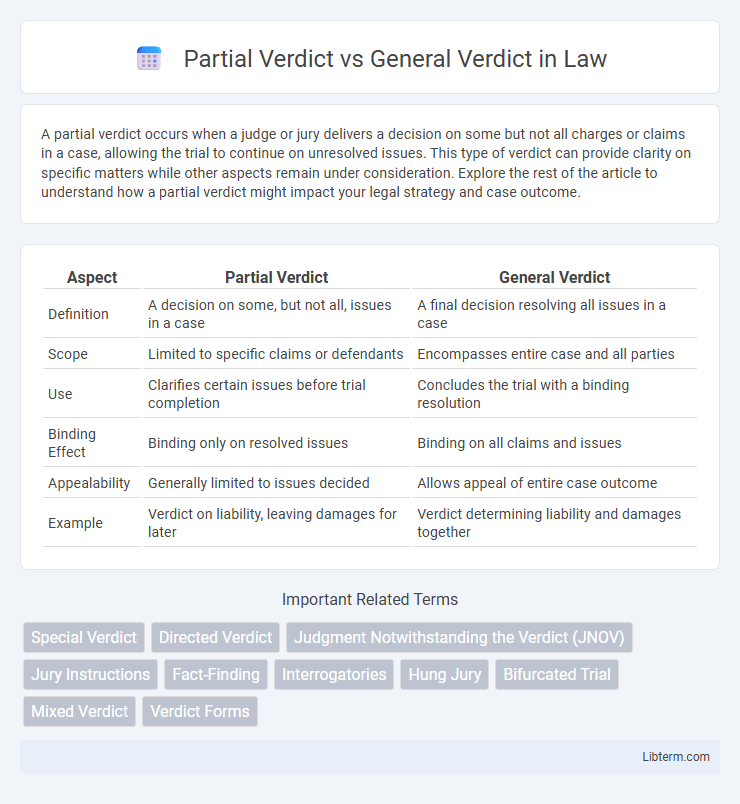A partial verdict occurs when a judge or jury delivers a decision on some but not all charges or claims in a case, allowing the trial to continue on unresolved issues. This type of verdict can provide clarity on specific matters while other aspects remain under consideration. Explore the rest of the article to understand how a partial verdict might impact your legal strategy and case outcome.
Table of Comparison
| Aspect | Partial Verdict | General Verdict |
|---|---|---|
| Definition | A decision on some, but not all, issues in a case | A final decision resolving all issues in a case |
| Scope | Limited to specific claims or defendants | Encompasses entire case and all parties |
| Use | Clarifies certain issues before trial completion | Concludes the trial with a binding resolution |
| Binding Effect | Binding only on resolved issues | Binding on all claims and issues |
| Appealability | Generally limited to issues decided | Allows appeal of entire case outcome |
| Example | Verdict on liability, leaving damages for later | Verdict determining liability and damages together |
Introduction to Partial Verdict and General Verdict
A partial verdict occurs when a jury renders decisions on some but not all counts or charges in a case, allowing certain issues to be resolved while others remain undecided. In contrast, a general verdict represents the jury's complete decision on all charges or claims presented during the trial, finalizing the outcome. Understanding the distinction is crucial in legal proceedings, as partial verdicts can lead to further deliberations or retrials on unresolved matters.
Definition of Partial Verdict
A partial verdict occurs when a jury reaches a decision on some, but not all, issues in a trial, allowing the court to address specific matters before resolving the entire case. This type of verdict enables the trial to proceed with fewer unresolved questions, often expediting the litigation process. Unlike a general verdict, which resolves all claims and issues fully, a partial verdict provides a segmented approach to decision-making in complex cases.
Definition of General Verdict
A general verdict is a jury's final decision on all issues in a trial, determining the defendant's liability or guilt without specifying factual findings. Unlike a partial verdict, which resolves only some claims or counts, a general verdict provides a conclusive judgment covering the entire case. Courts rely on general verdicts to finalize disputes efficiently unless the verdict is ambiguous or incomplete.
Key Differences Between Partial and General Verdicts
Partial verdicts resolve only specific issues or charges within a case, leaving other matters undecided for further deliberation or trial. General verdicts provide a complete resolution by determining the overall outcome and final judgment on all claims or charges presented to the jury. Key differences include the scope of decision-making, with partial verdicts addressing segmented parts of a case and general verdicts concluding the entire case comprehensively.
Legal Contexts for Partial Verdicts
In legal contexts, a partial verdict occurs when a jury reaches a decision on some but not all issues in a case, allowing the trial to proceed on unresolved counts or charges. This type of verdict is particularly useful in complex trials involving multiple defendants, charges, or claims, enabling courts to address clear determinations promptly while reserving judgment on disputed matters. Partial verdicts help increase judicial efficiency by reducing the scope of remaining issues and facilitating potential settlements or plea agreements.
Advantages and Disadvantages of Partial Verdicts
Partial verdicts allow juries to deliver decisions on specific issues within a case, enabling quicker resolution of certain claims while other matters remain undecided. This approach can reduce court congestion and save time, but it may also lead to fragmented trials and increased complexity in managing multiple verdicts. The main disadvantage is that partial verdicts can prolong litigation if unresolved issues require further proceedings, potentially increasing costs and delaying final outcomes.
Advantages and Disadvantages of General Verdicts
General verdicts provide a clear, concise decision by the jury on the overall guilt or liability, simplifying the legal process and reducing trial duration. They minimize the risk of inconsistent or conflicting findings but limit detailed judicial insight into specific issues, potentially obscuring important facts. This lack of granularity can hinder appeals and post-trial motions, as the rationale behind the decision is not explicitly stated.
Impact on Appeals and Legal Proceedings
A partial verdict resolves some issues in a trial while leaving others undecided, which can lead to multiple appeals addressing distinct aspects of the case and potentially prolonging legal proceedings. A general verdict conclusively determines all factual and legal questions, limiting grounds for appeal to errors in law or procedure rather than factual disputes. Courts often find general verdicts streamline appeals and expedite case resolution, whereas partial verdicts may increase complexity by segmenting the appellate review process.
Notable Cases Involving Partial and General Verdicts
The landmark case of Sullivan v. Louisiana (1993) established critical precedents regarding partial verdicts by highlighting their impact on a defendant's right to a unanimous jury decision. In People v. Superior Court (Howard) (1992), the California Supreme Court examined the implications of general verdicts in criminal trials, particularly how comprehensive jury decisions streamline appeals and retrials. These notable cases underscore the judicial balance between jury deliberation scope and verdict finality in shaping American trial law.
Conclusion: Choosing Between Partial and General Verdicts
Partial verdicts allow juries to decide specific issues, providing flexibility in complex cases and facilitating settlement discussions. General verdicts deliver a single, comprehensive decision, simplifying the process but potentially obscuring detailed reasoning. Choosing between partial and general verdicts depends on the case complexity, need for clarity in jury findings, and strategic trial considerations.
Partial Verdict Infographic

 libterm.com
libterm.com